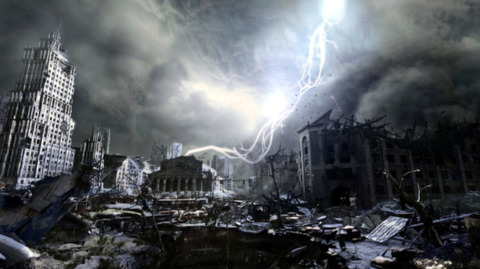Rubin: Metro: Last Light budget was 10 percent of competitors'
Former THQ president Jason Rubin claims developer 4A Games was "never playing on a level field," says devs worked in freezing temperatures when heat went out.
Former THQ president Jason Rubin has opened up on the challenges developer 4A Games faced during the development of the warmly received Metro: Last Light. 
In a Games Industry International column, Rubin said the Kiev, Ukraine studio was at a disadvantage from the get-go and had just a fraction of the budget of its competitors.
"Let's be honest: 4A was never playing on a level field," Rubin said. "The budget of Last Light is less than some of its competitors spend on cut scenes, a mere 10 percent of the budget of its biggest competitors. Yet it is lauded for its story and atmosphere."
"It is built on a completely original and proprietary second-generation engine that competes with sequels that have stopped numbering themselves, with more engineers on their tech than 4A has on the entire project," he went on. "Yet its tech chops are never in question."
Compounding the struggles for 4A Games was the working conditions for the Ukrainian team at its office Kiev, Rubin said. He claimed the studio's office was undersized and that developers sat on folding chairs elbow-to-elbow.
"And all of this is compounded by the conditions this Ukrainian team works under in Kiev. The entire 4A studio would fit easily in the (underutilized) gym at EA Los Angeles' offices," Rubin said. "Yet Last Light's Metacritic score blows away Medal of Honor: Warfighter. As undeniably fantastic as competitor BioShock Infinite may be, the team was given whatever resources they needed to make the title. At the same time, 4A's staff sat on folding wedding chairs, literally elbow-to-elbow at card tables in what looks more like a packed grade school cafeteria than a development studio."
Rubin went on to explain that when 4A Games needed another development kit or a high-end PC, someone from the studio had to fly to the United States and sneak it back to Ukraine in a backpack or else it be "seized at the border by thieving customs officials."
He also said that the Ukrainian government's heating facilities break down a few times a year for a week at a time. This did not keep 4A Games staffers from coming to work, Rubin said.
"Then 4A works in their parkas and struggles to keep their fingers warm in temperatures well below freezing. That is unless it snows and they get stuck home for a few days at a time because snow clearing isn't up to Western standards," he said.
Rubin explained that it is not his intention to guilt gamers into buying Metro: Last Light with his report of the working conditions for 4A Games. Rather, he said much in the same way that sports fans may have been more interested in Jeremy Lin after learning he received no scholarships and went to the NBA undrafted, the same can be true for 4A Games.
"If you care about the art of making games then you have to care about more than the final product," Rubin said. "The struggle and the journey becomes part of the story. Like sport, you cheer when the underdog comes from behind, and triumphs in the face of incredible odds."
Metro: Last Light launched yesterday for Xbox 360, PlayStation 3, and PC published by Deep Silver, which acquired the franchise from THQ in January for $5.8 million. For more, check out GameSpot's review.
Paper Mario: The Thousand-Year Door – Official Switch Overview Trailer Sand Land Review Stellar Blade - Official Launch Trailer | PS5 Games SaGa Emerald Beyond – Official Launch Trailer Another Crab's Treasure Is A Soulslike 3D Platformer | GameSpot Review Stellar Blade Review That Time I Got Reincarnated as a Slime ISEKAI Chronicles – Official Announcement Trailer MEGATON MUSASHI W: WIRED – Official OP “MUSASHI English Ver.” Trailer Gothic 1 Remake | Official Collector's Edition Trailer Super Monkey Ball Banana Rumble - Official Multiplayer Features Trailer PUBG | Erangel Classic Returns Genshin Impact - "Arlecchino: Afterglow of Calamity" | Collected Miscellany
Please enter your date of birth to view this video
By clicking 'enter', you agree to GameSpot's
Terms of Use and Privacy Policy
Got a news tip or want to contact us directly? Email news@gamespot.com
Join the conversation